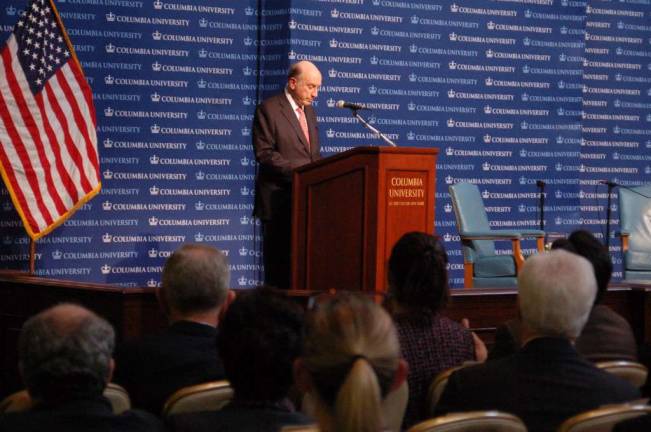President Emeritus Reflects on His 60 Years at Columbia

Former Columbia President Michael I. Sovern shares his life (and memoir) with family, colleagues and friends
Despite his innumerable accomplishments over the years, Michael I. Sovern, President Emeritus of Columbia University, remains remarkably humble.
Sovern was president of Columbia from 1980 to 1993, during, arguably, the school's worst financial crisis. After receiving his bachelor's degree and then graduating from Columbia's law school, he soon returned as the youngest full faculty member. He found himself a colleague of many of his former professors.
Before his reading at Columbia's Low Memorial Library in honor of his new memoir, An Improbable Life: My 60 Years at Columbia and Other Adventures, the West Side Spirit had a chance to talk with the man who has seen and done it all, with Columbia University never far from his mind nor heart.
Sovern explains he originally began penning his memoir with the intent of showing his grandchildren "what the old man had done." He started it in a playful spirit. Until recently, one of Sovern's own daughters had never even heard her father give a speech.
Ultimately, Sovern fell in love with the project, notably after a stay at a writer's retreat with a "strong work ethic," he jokes.
Sovern's memoir covers far more than you could imagine happening in one man's lifetime. And, as current president Lee C. Bollinger points out, "No university has had Columbia's highs and lows."
Sovern echoes Bollinger: "When I became president we were broke."
Sovern believes the most meaningful thing he accomplished at Columbia was generating key values. He made a serious effort to reform the working environment and attract top faculty to the university.
He was also committed to preserving need-blind admissions and "addressing the deteriorating physical situation" at Columbia. He adds that at commencement in 1980, a student was killed by falling masonry.
"We had life-threatening aspects and these things cost money," says Sovern. "I had to address that."
While Sovern says the Columbia of today, where he serves as the Chancellor Kent professor of law, very much resembles the Columbia of his undergraduate years, one of the greatest transformations he believes was the decision to make the school co-educational.
Despite the many challenges along the way, Sovern still calls his presidency at the university the most rewarding experience of his life.
At the Columbia reading, Sovern reads a thrilling excerpt about a time during his presidency when he brought Salman Rushdie in to speak, quite the remarkable feat as Rushdie was being heavily targeted by radical Muslim assassins at the time.
"Several hundred people gasped in unison," Sovern says, describing Rushdie's unveiling. "The first amendment had a fitting send-off for the beginning of its third century."
In conversation with Bollinger following the reading, Sovern talks about one of his many legal feats over the years-representing victims in the Tuskegee Syphilis Experiment which claimed the lives of many African-Americans. Sovern calls the experiment the "most shocking racial exploitation in America since the Civil War and Reconstruction."
Sovern also touches on the "other adventures" his memoir's title alludes to, such as his time as Chairman at Sotheby's. He notes sometimes one must have "the confidence to do things you're not qualified to do."
The crowd at Columbia was filled with those who have loved and respected Sovern over the years; the Q&A session a warm and humorous gathering of old pals who have shared many unimaginable memories.
Sovern's intellectual, legal and activist pursuits aside, the former president also once managed to throw a strike at Yankee Stadium, as a crowd member was quick to remind him.